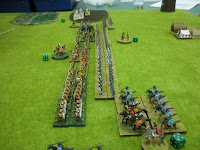
Character Series nº 1 - Winston Leonard Spencer Churchill
(Part III)
As a young aristocrat, WC had to mantain a certain status and appearances, at several leves, much to the liking of the Victorian British society. As a Lt in the British army, his pay was somewhat symbolic - for a well born gentleman, that is.
But WC had always two handy solutions for his recurrent financial problems: dear old Mamma and chronic debt - after all, a merchant was almost a sub-human to an aristocrat, and should be more than grateful to be given the privilege of having a social superior as his debtor.
These were the two main resources he used to mantain a life style clearly above his personal means. There are pictures of him with his 5 polo ponies, in India. WC and two of his friends (good old Reginald included) rented a rather large bungalow to live in, where they had more than ten servants at their disposal - noblesse oblige...
(The Frontier War - continuation)
Bangalore, capital of the Mysore state, in India, was to be WC's and the 4th Queen Own Hussars new home for the near future.
At the time the territory included modern day India, Pakistan, Bangladesh, Sri Lanka and Myanmar - all of 1.807.112 square miles of territory covered by about 264.000 soldiers (all ranks included) of the British army, plus 147.000 native troops.
WC got more or less bored of his daily routine and military duties while in cantonment, but nevertheless seemed more than able to cope with all of them and was appreciated by the troopers. He tried again, during this period, to join Kitchener in Sudan, but was refused, more than once.
But his luck stood by him (if you consider this luck...). On July 1897 they had a major uprising of Muslim tribesmen on the North-West Frontier of India, along the border of Afghanistan. That was not his cantonment area, but he sucessfully managed to obtain permission to visit the war zone, once again as a war correspondent (this time for several newspapers) - but this time he would also prove his mettle in battle.
What was is avoued purpose ? To have "a good chance of seeing active service and securing a medal" - in his own words.
He joined the Malakand Field Force as an extra ADC to General Bindon Blood, in 2 September 1897. On 16 of that same month, WC was with the 2nd Brigade of that Force in the Mohmand valley, where he got himself involved in a major combat action - and a deadly one at that. He remebered it as one of the most dangerous days of his life. And he had more of the same in the following days.
Once more, he acquitted himself well in the field of battle and was favoursly mentioned in several after action reports by superior officers.
In the end, he got from his service in India what he did not expect at first: a medal (the India Medal 1895, army order nº 77, of 11 June 1898). His articles for local and English newspapers were, once again, a source of recognition, within and outside the militay institution.
He also developed other traits of his personality while over there: he became recognized as outspoken, ambitious, egocentric, a medal hunter and a self-advertiser - you tell me if these are qualities or faults, in the man WC proved to be.
(The Sudanese War - Omdurman)
WC simply could not take a "no" for an answer. Since he did not receive an official appointement as he several times requested to the Egyptian army, he decided to go directly to the seat of power (London), while on leave, and personally ask (lobby...) for it.
Possibly he was afraid they could run out of Dervishes to shoot, at any moment.
His efforts paid off. In 2 August 1898 WC arrived in Cairo (Egypt) with a nomination as a supranumerary Lt to the 21st Lancers. By the way, his appointment mentioned that he had to travel at his own expense and in case of his injury or death no charge of any kind would fall on the British army funds. It had taken him two years to secure this appointment and he was not going to let such trivialities to stand in his way or deter him.
As usual, his mind was also on pratical things. He made arrangments with the Morning Post newspaper, to send letters about the campaign (also as usual, in exchange for some £).
OK, now I have to stop here, or else my boss will start complaining.
In my next post I'll let you know about the effects of WC's Mauser automatic pistol on the poor old Dervishes.
PC







































